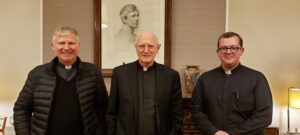In December 2021, the Vocations Team, Fr. Séamus McEntee (Vocations Director) and Fr. Bill O’Shaughnessy (Assistant Vocations Director) met with Archbishop Dermot Farrell to discuss the promotion of vocations for the 2022.
Ordination To Transitional Diaconate
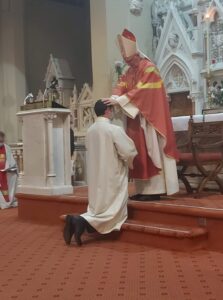
Archbishop Dermot Farrell ordained seminarian Joe Keegan to the Transitional Diaconate on Saturday 3rd July 2021. The Ordination took place in the parish of the Immaculate Conception and St. Killian, Clondalkin. In his homily, Archbishop Farrell said “In sharing in the Sacrament of Orders, the deacon is authorised and empowered to order, direct, focus the attention of the people on their dignity as baptised members of the Body of Christ. The deacon is called to help the people, and himself, to “judge wisely the things of earth and hold firm to the things of heaven” (Concluding Prayer, Second Sunday of Advent). You are continuing in your life, and the lives of others, what you recognise you have experienced of Christ. The diaconal ministry is not so much a copying of the life of Jesus, as a continuation of it. Joe will do that not just through his preaching and teaching, but in the conduct of his life. The promise of celibacy which you make today is an expression of the total gift of self which you make to God and to his people. In the end, celibacy is not a matter of reason but of love, a form of life adopted by a man in love with God.”
The Vocations team have asked that you continue to keep Joe in your prayers as he continues on his journey to priesthood.

(L-R) Rev Deacon Joe Keegan, Fr. Damian Farnon (Army Chaplain) Archbishop Dermot Farrell (Archbishop of Dublin), Fr. Séamus McEntee (Vocations Director of Dublin and Chief Chaplain SJYPS), Permanent Deacon Don Devaney
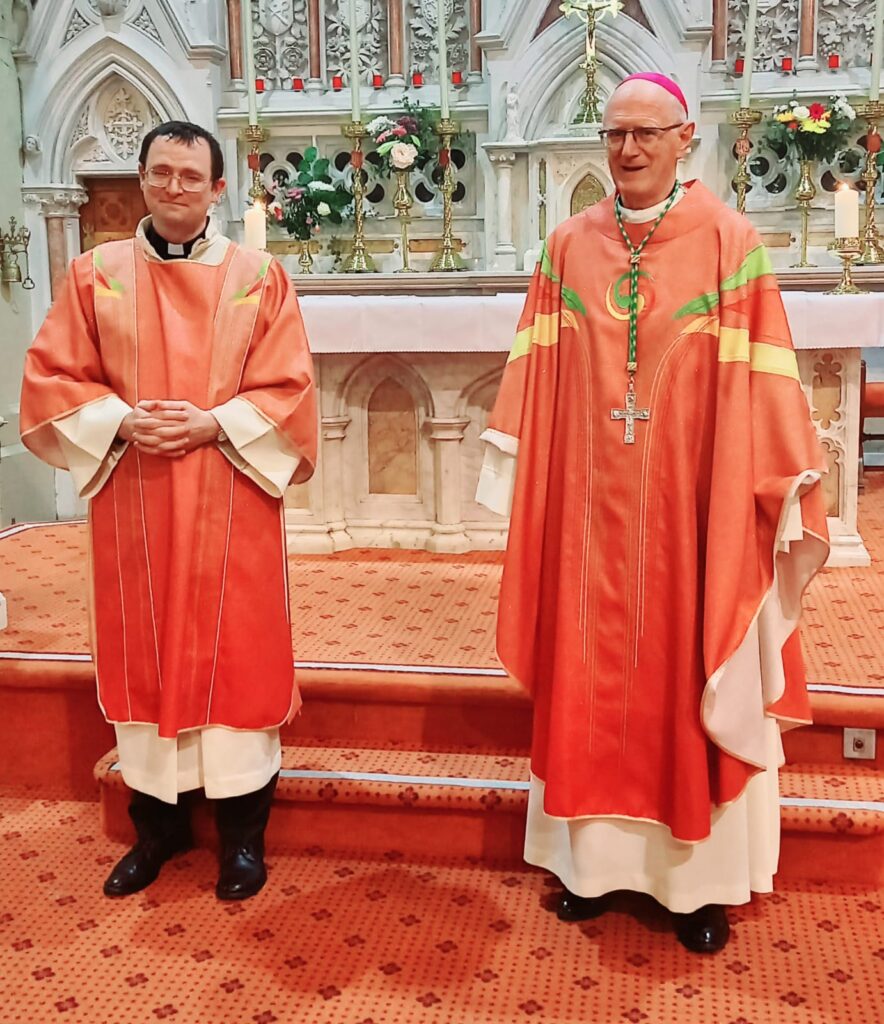
Deacon Joe Keegan and Archbishop Dermot Farrell
Prayer Resources for Vocations to Priesthood
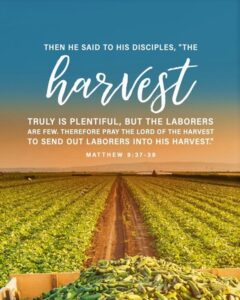 As we begin a new year, let’s keep Vocations to Priesthood especially in our prayers. God continues to call all who are baptised to follow Him and He calls some to follow through the ministry of Priesthood. Let us “pray therefore the Lord of the harvest to send out labourers into his harvest.” (Mt 9:38) The following link will bring you the parish resources for the period from next Sunday (The Baptism of the Lord) up to the Sixth Sunday in Ordinary Time. These comprise sample intercessory prayers and also some inserts which you might consider using in your parish newsletter or social media now or at some other time throughout the year. The link is:
As we begin a new year, let’s keep Vocations to Priesthood especially in our prayers. God continues to call all who are baptised to follow Him and He calls some to follow through the ministry of Priesthood. Let us “pray therefore the Lord of the harvest to send out labourers into his harvest.” (Mt 9:38) The following link will bring you the parish resources for the period from next Sunday (The Baptism of the Lord) up to the Sixth Sunday in Ordinary Time. These comprise sample intercessory prayers and also some inserts which you might consider using in your parish newsletter or social media now or at some other time throughout the year. The link is:
If you know of someone interested in finding out more about the a vocation to priesthood within the Archdiocese of Dublin you can direct them to our website: dublindiocese/vocations
or please invite them to email the vocations director Fr. Enda Cunningham at: vocations@dublindiocese.ie or Fr. Séamus McEntee at: seamusmcentee@yahoo.com
“The pandemic has shown that people still need and value their priests”
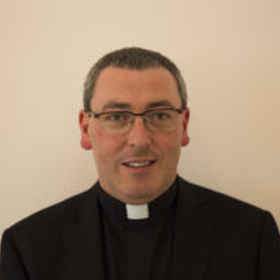
Fr Tomás Surlis
(The Irish Catholic, October 8th 2020)
The vocations crisis is rooted in a social, cultural and ecclesial landscape that has changed radically in the last 20 years, writes Fr Tomás Surlis
The return to seminary this year was particularly challenging, given the current pandemic. However, we approached the challenge with vigour, since the experience of a common life is central to the experience of priestly formation in Ireland and across the world today. Living with and for each other helps our seminarians to develop the necessary skills they will need in priestly ministry going forward. In the seminary, the way we live is designed to prepare future priests for the reality of ministry in a changed and changing society and culture. Skills such as being a generous person for others, being a builder of communion and community, being a team leader and a person who collaborates with lay women and men at parish and diocesan level, as together the people of God exercises its co-responsibility for the life of the Church in our times, such as those called for by the Congregation for the Clergy in its recent instruction on The Pastoral Conversion of the Parish Community in the service of the evangelising mission of the Church (2020). Such attitudes of heart and mind are especially important in an ecclesial landscape that cries out for priests filled with zeal for both ministry and mission.
In 2019, the National Seminary welcomed thirteen (13) new seminarians. Eight (8) of these came into the first year of the Discipleship Stage of Philosophical Studies and five (5) entered what is known as the Configuration Stage of Theological Studies. This brought the number of full-time resident seminarians in St Patrick’s College, Maynooth to thirty-three (33), up from twenty-two (22) in 2018-19. Of the thirty-three (33), twenty-seven (27) were in formation for Irish dioceses, with a further two being sponsored by an Irish diocese with a view to ministering in that diocese for some time after ordination, before returning to their home diocese. The remaining three were in formation for a diocese outside of Ireland.
In 2020, in keeping with HSE and Bishops’ Conference guidelines on social distancing and sanitisation, we made ready to welcome thirty-two (32) resident seminarians. This number includes eight (8) new seminarians. Five (5) of the new seminarians entered the Discipleship Stage of Philosophical Studies, with two (2) of these undertaking a degree in Arts (including Philosophy) in Maynooth University. The other three (3) entered the Diploma Programme in Philosophy and Arts in the Pontifical University. Three (3) seminarians joined us in the Configuration Stage of Theological Studies, having completed their studies in philosophy outside of Ireland. Of the thirty-two (32) resident seminarians in Maynooth at the start of this year, twenty-seven (27) were in formation for Irish dioceses.
There is no doubt that people are sometimes shocked when they hear that there are just around thirty men in formation for the priesthood in the National Seminary. People speak of a ‘vocations crisis.’ They are correct. There is a crisis of vocation in the Church in Ireland and across many parts of the Western World, particularly in Western Europe. This is rooted in a social, cultural and ecclesial landscape that has changed radically in the last twenty years. The current pandemic has exposed some of the real potential that exists for developing forms of collaborative ministry and co-responsibility in the life of the Church.
In the National Seminary, we are continuing to energetically implement the insights of the 2016 document on priestly formation called The Gift of the Priestly Vocation. Together with Saint John Paul II’s seminal Apostolic Exhortation Pastores dabo vobis – I will give you shepherds (1992), this new document has guided the Irish seminaries in formulating a National Admissions Policy, which was approved as a working document by the Irish Bishops at their June 2020 meeting. The 2016 document has also helped a committee, of which I was a part, to put together a draft of a national Directory for Priestly Formation in Irish Seminaries which the bishops are currently considering before it is sent to the Holy See for the recognitio. This new Directory represents an update of the existing Programme for the Formation of Priests in Irish Seminaries (2006). This is indeed timely, as the landscape in which future Irish priests will minister has changed significantly, even since then.
When I entered the seminary in 1998, I came from a family background and experience of parish where the vast majority of people attended Sunday Mass. The support I received in my decision to leave a fulfilling job as a teacher in Coláiste Iognáid in Galway to enter formation for priesthood in the diocese of Achonry was strong and heartfelt, from family, from friends and from my students and colleagues in Galway. To be honest, I almost took such support for granted. If I were entering seminary today, I’m not sure if the same level of support would be there from outside my family circle. Many of the men entering the seminary today are coming either from third-level institutions or the world of work. Some still come from second-level education but they, and all the others who come into first year, have the experience of one year of seminary formation behind them, in what is called the Propaedeutic Stage, before they come to Maynooth. This is a good thing and a most welcome development. It means that the settling in process takes far less time and that they are already familiar with many of the aspects of seminary life which, in my first year, took quite some getting used to.
The promise of the Lord of the Harvest to send labourers into his harvest still holds true. The wonder is not that there are so few responding to the call; the wonder is that there are so many who are able to hear that call amidst the cacophony of voices that clamour for their attention in our busy and noisy world. I thank the bishops of Ireland for their continued expression of confidence in St Patrick’s College, Maynooth by entrusting the formation of their seminarians to us. I would also like to pay tribute to the diocesan Vocations Directors who are doing sterling work in vocations promotion, together with the Vocations Council of the Bishops Conference and the National Vocations Office which is based on the St Patrick’s College campus. I also pay tribute to the invaluable support (both prayerful and financial) that is given to seminarians by the St Joseph’s Young Priests Society and those women and men who pray for vocations to the priesthood and religious life all across the country. In Maynooth, we focus on the providing the best experience and highest standard of priestly formation possible. Not to do so would be to do a disservice to the men who are here, as well as to the people of God, from whom they come and to whom they will return as servants of the Gospel. The coronavirus pandemic has shown that people still need and value their priests. We are doing our very best to provide them with the priests they need: men for others, theactairí Chríost (messengers of Christ), holy men for a holy people.
Fr Tomás Surlis is a priest of the diocese of Achonry and Rector of the National Seminary, St Patrick’s College, Maynooth
Vocations Sunday 2020
This Sunday, 3 May, is Vocations or Good Shepherd Sunday, the dedicated annual day for Catholics around the world to offer special prayers to encourage vocations from families and parishes to the priesthood and to religious life.
In his message for Vocations Sunday Pope Francis says, “The first word of vocation, then, is gratitude. Taking the right course is not something we do on our own, nor does it depend solely on the road we choose to travel. How we find fulfilment in life is more than a decision we make as isolated individuals; above all else, it is a response to a call from on high. The Lord points out our destination on the opposite shore and he grants us the courage to board the boat. In calling us, he becomes our helmsman; he accompanies and guides us; he prevents us from running aground on the shoals of indecision and even enables us to walk on surging waters.”
For the full message and a range of resources, please visit: Vocations Sunday Resources 2020
Prayer to Discover Your Vocation
Almighty God,
You have made me to know you,
To love you, and to serve you,
And thereby to find and fulfil myself.
I know that you are in all things
And that every path can lead me to you,
But, of them all, there is one path especially
By which you want me to come to you.
Since I will do what you want of me,
I pray you; send your Holy Spirit to me;
Into my mind to show me what you want of me;
Into my heart to give me the determination to do it,
And to do it with all my love, with all my mind,
And with all my strength, right to the end.
Amen.
A Prayer for Seminarians
Father, thank You for the generosity of our seminarians.
Safeguard them as they prepare for the priesthood.
Keep all evil far from them, so they may become strong Christian men who are faithful to prayer, diligent in their studies, open to spiritual direction, and docile to all aspects of seminary formation.
Above all, enflame their hearts with love so they will be ardent and gentle shepherds for Your Church.
We make this prayer through the great High Priest, Jesus Christ our Lord.
Amen.
St. Charles Borromeo, patron of seminarians, pray for us.
******************************************************************************************************************
A PRAYER FOR VOCATIONS TO THE PRIESTHOOD
by Fr. Bill O’Shaughnessy, Tallaght Deanery Group (February 2020)
Lord our God, you said that “the harvest is rich
but the laborers are Few.
Pray, therefore, the Lord of the harvest to send labourers into his fields.”
Lord, we pray for your Spirit to send us holy priests.
To ignite the spark inside men to faithfully minister as priests in the Archdiocese of Dublin.
Fill them with zeal to come forward with a heart on fire with divine love, so they may become mirrors of Christ, your Son, in a world in need of His light, meaning, hope and courage.
Send to the Archdiocese of Dublin, strong and courageous spiritual shepherds, fearless in proclaiming the Resurrection of Christ anew for our time.
May these men of prayer be always open to the responsible call of service to your beloved people.
We ask this through Christ Our Lord – AMEN.
*****************************
‘The most important moment of my life” – Sixty years ago, 29 June 1951, Joseph Ratzinger was ordained a priest
2011-06-29 L’Osservatore Romano
In his essential and limpid autobiographical account published in 1997 – the original German is entitled Aus meinem Leben: Erinnerungen 1927-1977 (Milestones: Memoirs 1927-1977) – Joseph Ratzinger remembers with vivid simplicity his ordination to the priesthood. The great German Catholic Cardinal, Michael von Faulhaber (1869-1952), distinguished biblicist and patrologist, Archbishop of Munich and Freising from 1917, who during the dark years of the Third Reich had become one of the most courageous critics of Hitler’s regime, laid his hands on the 24-year old deacon in June 1951 and on his older brother Georg and 42 other young men.
“We were more than forty candidates, who, at the solemn call on that radiant summer day, which I remember as the high point of my life, responded “Adsum”, Here I am. We should not be superstitious; but, at that moment when the elderly archbishop laid his hands on me, a little bird—perhaps a lark—flew up from the high altar in the cathedral and trilled a little joyful song. And I could not but see in this a reassurance from on high, as if I heard the words “This is good, you are on the right way.”
There then followed four summer weeks that were like an unending feast. On the day of our first Holy Mass, our parish church of Saint Oswald gleamed in all its splendor, and the joy that almost palpably filled the whole place drew everyone there into the most living mode of “active participation” in the sacred event, but this did not require any external busyness. We were invited to bring the first blessing into people’s homes, and everywhere we were received even by total strangers with a warmth and affection I had not thought possible until that day.
In this way I learned firsthand how earnestly people wait for a priest, how much they long for the blessing that flows from the power of the sacrament. The point was not my own or my brother’s person. What could we two young men represent all by ourselves to the many people we were now meeting? In us they saw persons who had been touched by Christ’s mission and had been empowered to bring his nearness to men. Precisely because we ourselves were not the point, a friendly human relationship could develop very quickly.”
A priest for sixty years, Joseph Ratzinger carries out daily, with humility and transparence, the work of making the one Lord of the world and of history present to women and men of our time. For this, the Osservatore Romano offers Benedict XVI its best wishes, sure that its sentiments are echoed not only by those in the Catholic Church but by many others throughout the world. And repeats for him the words of the ancient prayer for the Pope, invoking Christ’s protection and the only happiness that counts: Dominus conservet eum, vivificet eum, beatum faciat eum in terra et non tradat eum in animam inimicorum eius.
Pope Emeritus Benedict XVI reflects on sixty years of priestly ministry
2011-06-29 Vatican Radio
Pope Benedict XVI celebrated Mass marking the feast of Saints Peter and Paul, patron saints of the city of Rome. During the Eucharistic celebration, the Pope also conferred the Pallium on 41 new Metropolitan archbishops, from countries all over the world, who have been appointed over the past year.
Attending the Mass in St Peter’s Basilica on Wednesday morning was a special delegation of three Orthodox leaders representing the Ecumenical Patriarch of Constantinople, Bartholomew I, part of a traditional exchange of ecumenical delegations which has helped to strengthen the bonds of friendship between the Churches of the East and West since shortly after the 2nd Vatican Council.
But the Mass also marked a personal moment of reflection for the Pope himself who was celebrating the 60th anniversary of his own ordination to the priesthood.
“Sixty years on from the day of my priestly ordination…
In his homily Pope Benedict said that sixty years on from his ordination, he can still hear the words that were addressed to the new young priests that day in 1951, the words of St John’s Gospel, ‘I no longer call you servants but friends.’ Words, the Pope added, that bring great inner joy and can also be seen as the entire programme of a priestly life.
“Friendship is not just about knowing someone, it is above all a communion of the will..
Reflecting on the meaning of that friendship with Christ, the Pope said it is above all learning to grow in ever greater conformity with His will, to know Him better through the Scriptures, through prayer, through the communion of Saints. Jesus’ words on friendship, he said, should be seen in the context of His commission to His followers to go and make disciples of all nations – a command which challenges us to move beyond the boundaries of our own world and to bring the Gospel to all people.
“On the feast of Saints Peter and Paul my most cordial greeting goes first of all to the Ecumenical Patriarch Bartholomew 1st …
After his intimate reflection on the meaning of his own priestly ministry, the Pope also greeted the Orthodox delegation present in the Basilica, as well as the new Metropolitan Archbishops who received the white, woollen Pallum, a symbol of service and a sign of a communion with St Peter and his successors. Pope Benedict concluded with heartfelt words of thanks to the Lord for the past six decades of his own service to the Church, as well as thanks to all the people who, he said, have formed and accompanied me.
Why Not Take Some Time to Pray Using Our Icon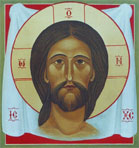
In silence gaze upon the face of Christ
He is calling you by name
He wants your happiness
Listen for his voice.
One thing I ask of the LORD,
this is what I seek:
that I may dwell in the house of the LORD
all the days of my life,
to gaze upon the beauty of the LORD
and to seek him in his temple.(Allow these words to find a home in your heart)
In the silence of this moment ask the Lord to reveal to you the depths of his love and give us his peace.
Seek His Face
A Prayer Initiative of the Vocations Office
One of Irelands leading Iconographers, Sr Aloysius McVeigh, a Mercy Sister, from Derry, has provided us with an appropriate icon as the focus of our prayer.
The icon depicts the face of Christ. Its title is ‘Achieropoitos’ (image not made by hands), and is based on the shroud of Turin. This image is very appropriate as it is Christ who is the one who calls us to our true vocation in life– the vocation of holiness.
The theme of the prayer endeavour is ‘Seek his face’. This icon was blessed by his Holiness Pope Benedict in Rome over Easter and will travel around our diocese spending a week in parishes encouraging parish communities to pray for vocations.
Look to the LORD and his strength;
seek his face Always.
1 Chronicles 16:11
Allow these words to enter into your heart
Slowly Read the Following Passage:
The Calling of the First Disciples
As Jesus was walking beside the Sea of Galilee, he saw two brothers, Simon called Peter and his brother Andrew. They were casting a net into the lake, for they were fishermen. “Come, follow me,” Jesus said, “and I will make you fishers of men.”
At once they left their nets and followed him.
Matthew 4: 18-22
Where is the Lord Calling You?
Dear Lord,
You love me and you want me to be happy and at peace.
Reveal your face to me,
show me the path I must walk,
Give me wisdom to know where you are calling me and the courage I need today to answer that call
Help me to seek your face each and every day of my life so that my life can be spent in your service.
Through Christ our Lord. Amen.





